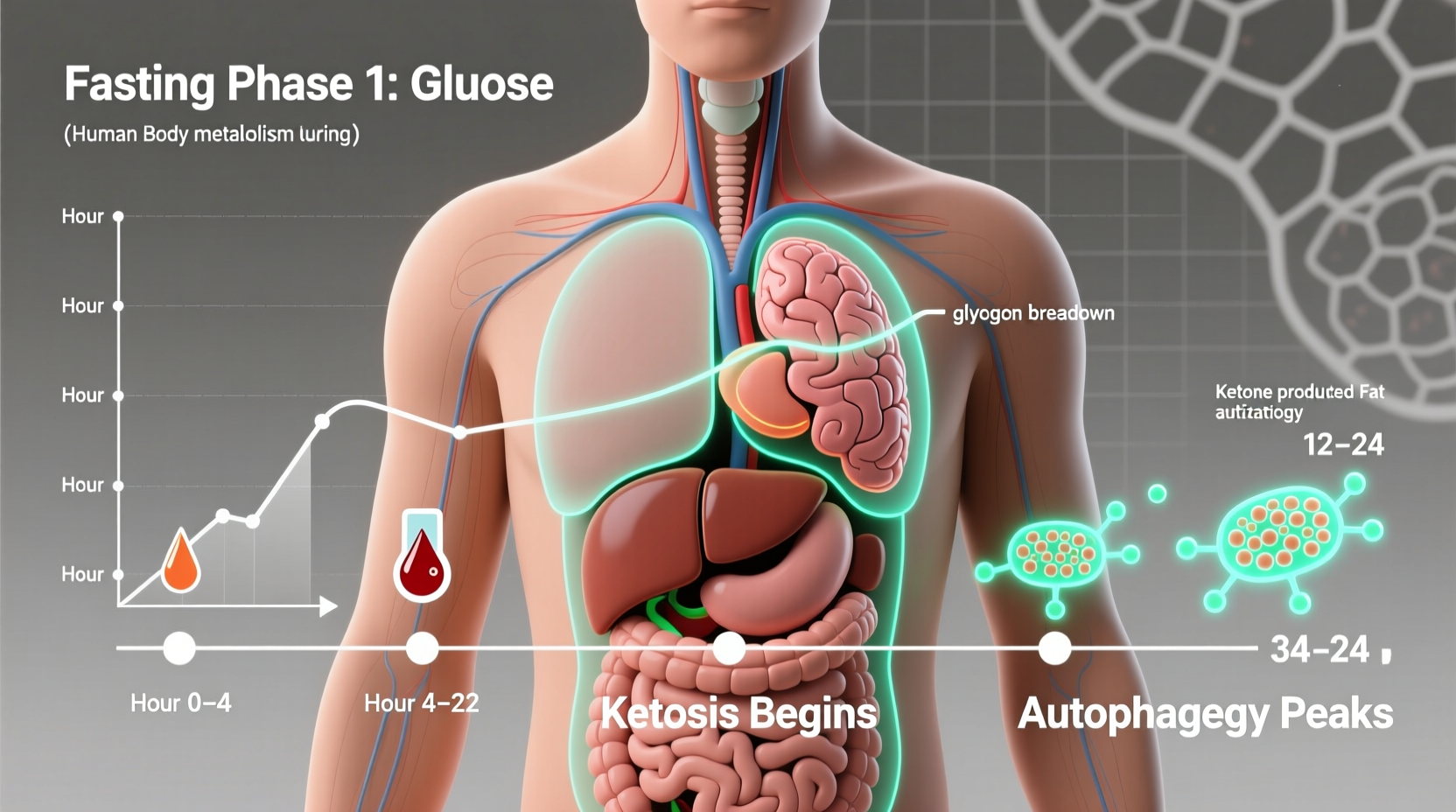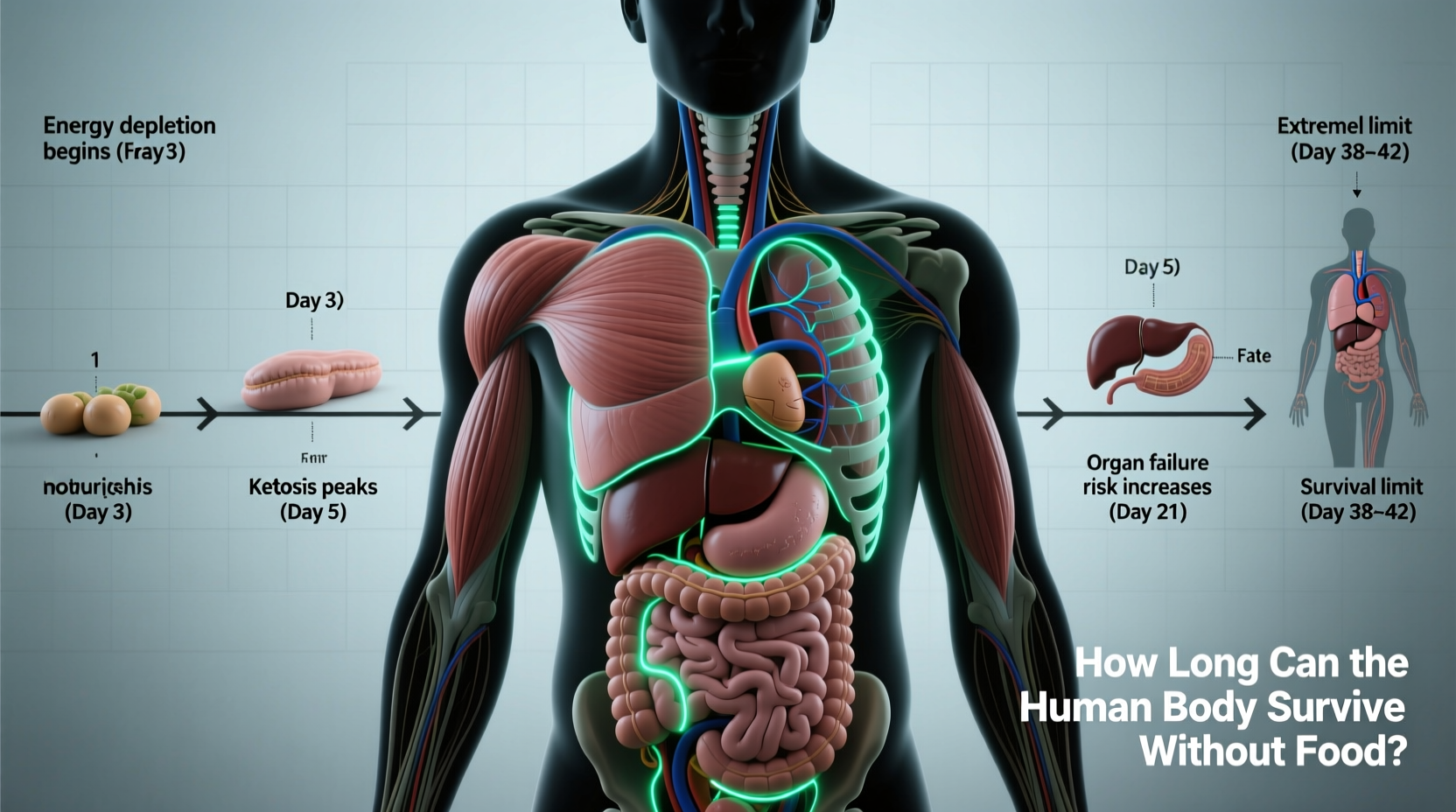Humans can typically survive 3-8 weeks without food when adequate water is available. This timeframe varies significantly based on body composition, health status, environmental conditions, and hydration levels. Medical supervision is critical for any extended fasting period.
The Science Behind Survival Without Food
Understanding how long the human body can endure without food requires examining the physiological processes that occur during fasting and starvation. Within hours of your last meal, your body begins shifting energy sources in a carefully orchestrated survival mechanism.
What Happens to Your Body During Fasting
When you stop eating, your body transitions through distinct metabolic phases. During the first 24-48 hours, your liver converts stored glycogen into glucose to maintain blood sugar levels. Once glycogen reserves are depleted, your body enters ketosis, breaking down fat stores to produce ketone bodies for energy.
| Time Period | Primary Energy Source | Physiological Changes |
|---|---|---|
| 0-24 hours | Glycogen stores | Blood sugar maintained, hunger increases |
| 2-3 days | Fat stores (ketosis) | Reduced hunger, mental clarity may improve |
| 1-2 weeks | Increased protein breakdown | Muscle loss begins, organ function starts declining |
| 3+ weeks | Severe protein catabolism | Organ failure risk increases significantly |
Factors That Determine Survival Timeframe
Your individual survival capacity without food depends on multiple interconnected factors. These variables explain why some individuals survive significantly longer than others under similar conditions.
Body Composition Matters
Body fat percentage serves as your primary energy reserve during starvation. Individuals with higher body fat percentages generally survive longer without food. A person with 15% body fat might survive approximately four weeks, while someone with 25% body fat could potentially survive six weeks or more, assuming adequate hydration.
Hydration Is the Critical Factor
Water availability dramatically impacts survival time. While you might survive weeks without food, you can only survive three to four days without water. Dehydration accelerates organ failure and significantly reduces the timeframe for surviving without food. In hot environments, dehydration occurs even faster, shortening survival time considerably.

Short-Term Fasting vs. Prolonged Starvation
It's crucial to distinguish between medically supervised short-term fasting and dangerous prolonged starvation. Intermittent fasting (16-24 hours) or medically supervised therapeutic fasting (up to 72 hours) differs fundamentally from complete starvation.
Medical Benefits of Controlled Fasting
Short-term fasting under medical supervision can trigger beneficial cellular processes including autophagy—the body's method of cleaning out damaged cells. Research from the National Institutes of Health indicates that controlled fasting periods of 24-72 hours may support metabolic health when properly managed.
Dangers of Extended Starvation
After approximately two weeks without food, the body begins breaking down essential proteins from muscle tissue and organs to maintain glucose production. The World Health Organization reports that prolonged starvation leads to irreversible damage to vital organs, particularly the heart, liver, and kidneys. Electrolyte imbalances become increasingly dangerous as starvation progresses.
Documented Cases and Medical Evidence
Historical records and medical studies provide valuable insights into human survival limits. The 1981 Irish hunger strike documented survival times of political prisoners who refused food while receiving water. Bobby Sands survived 66 days before succumbing to complications of starvation.
Conversely, the case of Terri Wang, who fasted for 382 days under strict medical supervision with vitamin supplementation, represents an extreme outlier. This case differs significantly from complete starvation as Wang received essential nutrients and medical monitoring.
When to Seek Medical Help
Signs that require immediate medical attention during fasting include:
- Dizziness or fainting spells
- Chest pain or irregular heartbeat
- Severe dehydration symptoms
- Prolonged nausea or vomiting
- Mental confusion or disorientation
The American Medical Association strongly advises against unsupervised fasting beyond 72 hours due to increasing health risks. Individuals with pre-existing medical conditions, particularly diabetes, heart conditions, or kidney disorders, should never attempt extended fasting without physician supervision.
Practical Guidance for Safe Fasting Practices
If considering short-term fasting for health or religious reasons, follow these evidence-based recommendations:
Preparation Is Essential
Gradually reduce meal sizes before beginning a fast. Ensure proper hydration in the days leading up to your fast. Consult with your healthcare provider if you have any chronic health conditions or take regular medications.
Breaking Your Fast Safely
Ending a fast requires as much care as the fasting period itself. Begin with small portions of easily digestible foods. Avoid large meals immediately after fasting, as this can cause refeeding syndrome—a potentially fatal condition where electrolyte imbalances occur when nutrition is reintroduced too quickly.
Monitoring Your Body's Signals
Pay attention to your body's warning signs. While mild hunger and temporary fatigue are normal during short fasts, severe symptoms indicate the need to end your fast and seek medical advice. Keep a journal of your physical and mental state throughout the fasting period.











 浙公网安备
33010002000092号
浙公网安备
33010002000092号 浙B2-20120091-4
浙B2-20120091-4